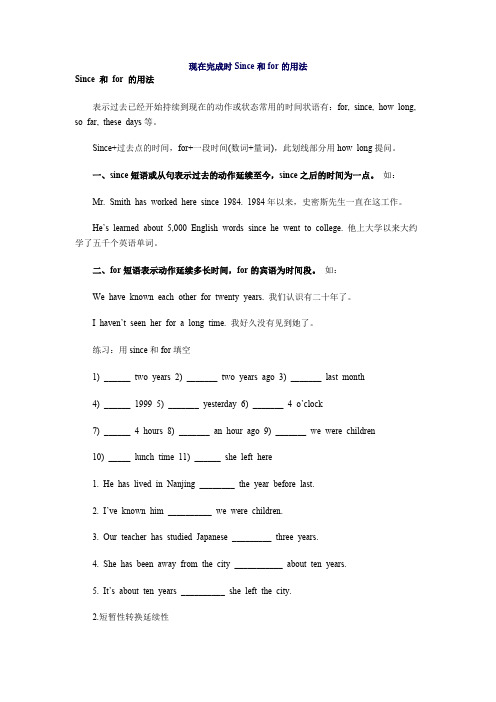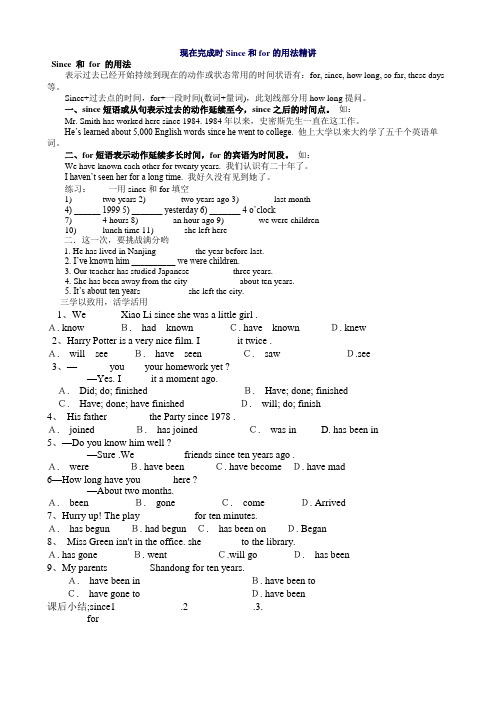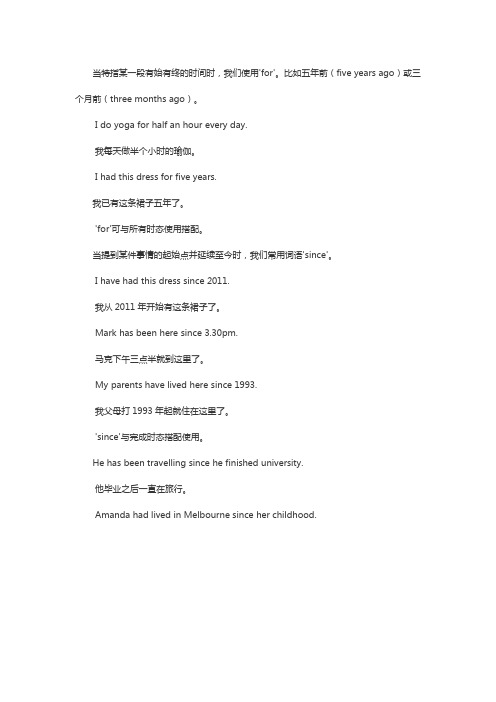区别since 和for的用法
现在完成时Since和for的用法

现在完成时Since和for的用法Since 和for 的用法 表示过去已经开始持续到现在的动作或状态常用的时间状语有:for, since, how long, so far, these days等。
Since+过去点的时间,for+一段时间(数词+量词),此划线部分用how long提问。
一、since短语或从句表示过去的动作延续至今,since之后的时间为一点。
如: Mr. Smith has worked here since 1984. 1984年以来,史密斯先生一直在这工作。
He’s learned about 5,000 English words since he went to college. 他上大学以来大约学了五千个英语单词。
二、for短语表示动作延续多长时间,for的宾语为时间段。
如: We have known each other for twenty years. 我们认识有二十年了。
I haven’t seen her for a long time. 我好久没有见到她了。
练习:用since和for填空 1) ______ two years 2) _______ two years ago 3) _______ last month 4) ______ 1999 5) _______ yesterday 6) _______ 4 o’clock 7) ______ 4 hours 8) _______ an hour ago 9) _______ we were children 10) _____ lunch time 11) ______ she left here 1. He has lived in Nanjing ________ the year before last. 2. I’ve known him __________ we were children. 3. Our teacher has studied Japanese _________ three years. 4. She has been away from the city ___________ about ten years. 5. It’s about ten years __________ she left the city. 2.短暂性转换延续性 ①arrive at/in sw. get to/reach sw. come/go/move to sw. →be in sw./at school/at home/on the farm/be here/be there 1) He got to Beijing five minutes ago. He ________ _________ _________ Beijing for _________ _________. 2) I moved to the USA last year. I ________ ________ __________ the USA since __________ __________. 3) I went home yesterday. I _______ ________ _________ home for _________ __________. 4) They came here last week. They _________ _________ here since _________ __________. ②come/go back, return →be back come/go out →be out 1) He came out two years ago. He _________ __________ _________ for __________ __________. 2) We return to Fuzhou yesterday. We ________ ________ _________ to Fuzhou since __________. ③become →be 1) I became a teacher in 2000. I ________ __________ a teacher for _________ _________. 2) The river became dirty last year. The river _________ _________ dirty for _________ __________. ④close →be closed open →be open 1) The shop closed two hours ago. The shop ________ _________ _________ for _________ _________. 2) The door opened at six in the morning. The door ________ ________ ________ for six hours. ⑤get up →be up die →be dead leave sw. →be away from sw. fall asleep/get tot sleep →be asleep finish/end →be over marry →be married 1) I got up two hours ago. I ________ ________ ________ since ________ ________. 2) He left Fuzhou just now. He _______ ________ ________ _________ Fuzhou for five minutes. 3) My grandpa died in 2002. My grandpa _______ _______ ________for _______ ________. 4) The meeting finished at six. The meeting ________ ______ ______ for six hours. 5) I got to sleep two hours ago. I ________ _________ _________ since _________ __________. 6) They married in 1990. They ________ _________ __________since _________. ⑥start/begin to do sth. →do sth. begin →be on 1) I began to teach at this school in 1995. I ____ ____ at this school since ____. 2) The film began two minutes ago. The film ____ ____ ____ for ____ ____. ⑦borrow →keep lose →not have buy →have put on →wear catch/get a cold →have a cold get to know →know 1) They borrowed it last week. They _________ _________ it since __________ __________. 2) I bought a pen two hours ago. I _________ _________ a pen for ________ __________. 3) I got to know him last year. I _________ __________ him since __________ __________. 4) I put on my glasses three years ago. I __________ __________ my glasses for _________ _________. ⑧have/has gone to →have been in 1) He has gone to Beijing. He ____ ____ _____ Beijing for two days. ⑨join the league/the Party/the army →be a league/a Party member/a soldier →be a member of the league/the Party →be in the league/the Party/the army 1) He joined the league in 2002. He ________ _________ a _________ _________ for two years. He ________ __________ a __________ ___________ the __________ for two years. He ____________ ___________ ___________ the league for two years. 2) My brother joined the army two years ago. My brother __________ __________ a ___________ for ___________ ___________. My brother ___________ ___________ in ____________ ___________ for two years. 3.汉译英 1)这本字典我已买了三年了。
现在完成时Since和for的用法

现在完成时Since和for的用法精讲Since 和for 的用法表示过去已经开始持续到现在的动作或状态常用的时间状语有:for, since, how long, so far, these days 等。
Since+过去点的时间,for+一段时间(数词+量词),此划线部分用how long提问。
一、since短语或从句表示过去的动作延续至今,since之后的时间点。
如:Mr. Smith has worked here since 1984. 1984年以来,史密斯先生一直在这工作。
He’s learned about 5,000 English words since he went to college. 他上大学以来大约学了五千个英语单词。
二、for短语表示动作延续多长时间,for的宾语为时间段。
如:We have known each other for twenty years. 我们认识有二十年了。
I haven’t seen her for a long time. 我好久没有见到她了。
练习:一用since和for填空1) ______ two years 2) _______ two years ago 3) _______ last month4) ______ 1999 5) _______ yesterday 6) _______ 4 o’clock7) ______ 4 hours 8) _______ an hour ago 9) _______ we were children10) _____ lunch time 11) ______ she left here二.这一次,要挑战满分哟1. He has lived in Nanjing ________ the year before last.2. I’ve known him __________ we were children.3. Our teacher has studied Japanese _________ three years.4. She has been away from the city ___________ about ten years.5. It’s about ten year s __________ she left the city.三学以致用,活学活用1、We ______ Xiao Li since she was a little girl .A. know B. had known C. have known D. knew2、Harry Potter is a very nice film. I_______ it twice .A. will see B. have seen C. saw D.see3、—______ you ___ your homework yet ?—Yes. I _____ it a moment ago.A. Did; do; finished B. Have; done; finishedC. Have; done; have finished D. will; do; finish4、His father ______ the Party since 1978 .A. joined B. has joined C. was in D. has been in5、—Do you know him well ?—Sure .We _________ friends since ten years ago .A. were B. have been C. have become D. have mad6—How long have you ____ here ?—About two months.A. been B. gone C. come D. Arrived7、Hurry up! The play __________ for ten minutes.A. has begun B. had begun C. has been on D. Began8、Miss Green isn't in the office. she _______ to the library.A. has gone B. went C.will go D. has been9、My parents ______ Shandong for ten years.A. have been in B. have been toC. have gone to D. have been课后小结;since1_____________.2_____________.3. _____________for_____________。
forsincebecause等区别

1、as意为“因为、由于”,语气比because弱,所引导的从句表示的是不言而喻、显而易见的原因和理由,其从句一般放在主句前,如:As it was late , we came back soon.(由于时间很晚了,我们很快就回来。
)2、because意为“因为”,指直接原因,语气最强,常表示必然的因果关系,引导的原因状语从句是全句意思的重心,它引导的从句一般放在主句的后面,回答以why引起的特殊疑问句,只能用because,如:Tom didn't go to school because he was ill.(汤姆没去上学,他病了。
)3、since意为“由于,既然”,所引导的从句表示的是已知为事实的理由和一种间接或附带的原因,语气比 because弱,但比as强,其从句一般位于主句之前,如:Since I have no money, I can't buy any food.(由于我没钱,所以我不能买食物。
)4、for是并列连词,用来附带解释或说明前面一句的情况,有时他它表示的理由是推测性的,它所引导的分句只能放在另一分句后,如:The day breaks,for the birds are singing.(天亮了,因为鸟在叫。
)详述二:because是从属连词,接表示直接原因的从句,一般放在主句的后面,也可放在主句前面,它表示的语气最强,在回答why的问句时,必须用because。
例如:The swimming pool won't be open today because they're making repairs.游泳池今天不开放,因为他们在修理。
Why did you move to France?你们为什么搬到法国?Because my father found work in Paris.因为我父亲在巴黎找到了工作。
注意:在英语中用了because后,不可再用so。
since, for, because, as, now that 表原因的用法区别

since, for, because, as, now that 表原因的用法区别in that通常用now that,是既然的意思。
since,for,because,now that的用法和区别:1.since(既然)语气较弱,强调已知的事实。
例:Since you can't answer the question, I'll ask someone else.既然你回答不出这个问题,我就问别人了。
2. for(因为)的用法:for是并列连词,表示推断的原因,或对前一分句补充说明理由。
例:It must be morning for the birds are singing.一定是清晨了,因为鸟儿在叫。
3. because (因为)的用法:because通常表示直接的原因。
because引导的从句表示直接而明确的原因和理由,表示按因果关系的推断,语气很强,用来回答why的问题, 一般位于主句之后。
例:We couldn't go out because it was too cold. 因为天气太冷,我们不能外出。
4. now that(既然)的用法:now that同since相似,语气较弱,强调人们已知的事实。
例:Now that you are busy, let me do it for you.既然你忙,就让我给你做吧。
5. as意为“因为、由于”,语气比because弱,所引导的从句表示的是不言而喻、显而易见的原因和理由,其从句一般放在主句前,如:As it was late ,we came back soon.(由于时间很晚了,我们很快就回来。
)区别:since和now that,表示事物发展的自然结果,特别是当对方大概已经了解其原因的情况下使用,表示既成事实的原因一般位于主句之前。
注意:for是并列连词,引出的原因较间接,似乎是事后所想到的补充解释的理由,只陈述一般推断的理由,不一定表示产生结果的必然原因,主要放在两个并列句之间。
现在完成时for 和since用法

现在完成时二用法:过去完成时表示过去发生的动作或存在的状态一直持续到现在(包括现在在内),常与for和since引导的时间状语连用,动词需要用延续性动词。
如:Mr.Green has been in China for 10 years .(格林先生来中国10年了)The film has been on for 20 minutes.(电影开始已经20分钟了)Since 与for的区别:for后面跟一段时间如:for three days for 2 years 等+ 过去的时间点:since 2004Since+ 一段时间ago :since two minutes ago+ 过去时的句子:since I came to this school用since 和for 填空:1.I have kept the book _______ a week , I must return it on time .2.We have learned English _______ 5 years ago, so we have learned it ______ 5 years.3.Miss Li has taught maths ________ she came to this school ..4.I have had a cold _______ yesterday.5.The workers have worked _______ 10 hours . They are very tired.6.Great changes have taken place in China ______ it was founded.7.Our teacher has studied Japanese ______ three years.8. She has been away from the city ______ about ten years.9.. It’s about ten years __________ she left the city.短暂性动词的完成时态不能和表示一段的时间状语连用,当它需要与表示一段时间的时间状语连用时,通常需进行转化,见书119页。
since、for的用法

当特指某一段有始有终的时间时,我们使用'for'。
比如五年前(five years ago)或三个月前(three months ago)。
I do yoga for half an hour every day.
我每天做半个小时的瑜伽。
I had this dress for five years.
我已有这条裙子五年了。
'for'可与所有时态使用搭配。
当提到某件事情的起始点并延续至今时,我们常用词语'since'。
I have had this dress since 2011.
我从2011年开始有这条裙子了。
Mark has been here since 3.30pm.
马克下午三点半就到这里了。
My parents have lived here since 1993.
我父母打1993年起就住在这里了。
'since'与完成时态搭配使用。
He has been travelling since he finished university.
他毕业之后一直在旅行。
Amanda had lived in Melbourne since her childhood.。
since和for的用法口诀
since和for的用法口诀
1. “Since 时间点呀,要记牢,就像火车有个起始站。
比如说 Since 1990,那就是从 1990 年开始呢!”
2. “For 时间段哟,别弄混,好像一段长长的旅程。
像 for two hours,就
是长达两个小时呀!”
3. “哎呀呀,since 后面跟时间点,这很关键呀!就好比你从哪一天开始踏上征途,since yesterday,从昨天起呀!”
4. “for 就是一段时间啦,多形象!for a week,这不就是一个星期那么长的时间嘛!”
5. “since 一出现,时间点就在那哟,想想 since last year,不就是从去年开始嘛,多简单!”
6. “for 在这里,时间段稳稳的,for several days,好几天呢,你记住了没!”
我觉得记住这些用法口诀,对大家正确使用 since 和 for 会很有帮助呢!。
用于现在完成时的since和for
⽤于现在完成时的since和for
⽤于现在完成时的since和for
到⽬前为⽌,我们已经知道现在完成时可以表⽰某⼀⾏为或状态从过去某时间⼀直持续到现在,这时常与表⽰⼀段时间的时间状语连⽤。
这类时间状语通常由since或for引导,具体⽤法如下:
1. since意为“⾃……以来”,既可作介词⼜可作连词。
作介词时,后接时间点;作连词时,引导时间状语从句,主句常⽤现在完成时,从句⽤⼀般过去时。
如:
Linda has lived in the town since 2003.
My father has been away from his home town since he was a child.
2. for作介词,后接⼀段时间。
如:
Tim has already studied Chinese for four years.
3. 对现在完成时的时间状语提问时,常⽤how long。
如:
—How long have you worked in this company?
—For six years. / Since six years ago.
【注意】
在英语中,⼀些表⽰短暂意义的动词,除在现在完成时的否定句中与表⽰⼀段时间的时间状语连⽤外,⼀般不和表⽰⼀段时间的时间状语连⽤。
如:
My uncle hasn’t come to my home for three months.
We haven’t seen the little dog since last Sunday.
George has come to China for two days.。
比较since
比较since,for,because,asA :Since 用来说明动作起始时间,就是一个时间点。
for用来说明动作延续时间长度。
注意时态为现在完成时,一般如此。
I have lived here for more than twenty years.I have lived here since I was born……I have not heard from my uncle for along time.注意:并非有for 作为时间状语的句子都用现在完成时。
结合实际灵活运用。
I worked here for more than twenty years.(我现在已不在这里工作。
)I have worked here for many years.(现在我仍在这里工作。
)B:The difference of ‘because ,as ,since, for’ used for giving reasons.1. 原因明显否,显而易见则用since,as 。
否则用becausebecause 语势最强,用来说明人所不知的原因,回答why所提出的问题;当原因是显而易见的或已为人知的,就用as或since。
2. 替代情况。
如符合句子末尾,逗号,直接原因三个条件,则because和as可以互换。
由because引导的从句如果放在句末,且前面有逗号,则可以用for来代替。
但如果不是说明直接原因,而是多种情况难以判断,就只能用for。
3.位置差别。
其实这个不是很重要了。
Because等的位置主要是依强调对象不同为不同罢了。
as常放于句首(也可未),because常放于句尾(也可首),for,只用于句中(句尾)四者均可用来表示原因,区别如下:(1) 关于because:语气最强,表示直接原因,可用于回答why 提出的问题、引导表语从句、用于强调句等,而其余三者均不行:“Why didn’t he come?” “Because he wasill.” “他为什么没来?”“因为他病了。
since的用法时态和for
since的用法时态和for一级标题:引言since的用法、时态和for是英语学习中常见的难点之一。
正确使用这些词可以使句子更加清晰、准确,提升语言表达的质量。
本文将深入讨论since的用法、时态和for以及它们在不同上下文中的意义和区别,并提供丰富的例句来帮助读者更好地理解与运用。
二级标题1:since的用法1. 表示时间:Since通常用于表示一个过去事件发生的具体起始时间,后面跟着一个具体时间点或日期。
示例:- I haven't seen her since last week.自从上周以来我就没有见过她。
- They have been married since 2010.他们自2010年结婚至今。
2. 表示原因/理由:Since也可以表示给出一个已知事实作为论据或解释某件事情发生的原因。
在这种情况下,often与because连用。
示例:- Since it's raining, we should bring an umbrella.既然下雨了,我们应该带把伞。
- I can't attend the meeting since I have a prior obligation.我因有先前安排而无法参加会议。
3. 表示自从某个事件发生以来一直延续到现在,并强调这段时间内的连续性。
示例:- They have been living in that house since 2005.他们从2005年住在那个房子里到现在。
- She has been practicing piano every day since she was five.自从她五岁起,她就每天都在练习钢琴。
二级标题2:时态和for1. 一般现在时:在过去的某一点开始并且一直延续到现在或者与现在有关的动作或状态,可以使用一般现在时。
示例:- I have known her since we were in high school.我们上高中时就认识她了。
